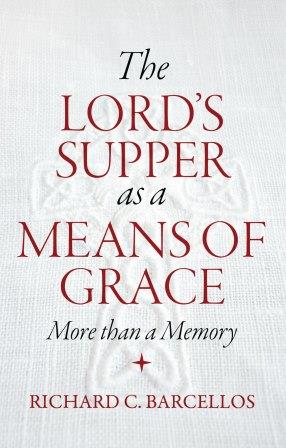I submit that the churches need to recover the Bible’s theology of “corporate piety.” American Christianity tends to emphasize personal devotion and individual communion with Christ. As important as that is, we desperately need to recover what the Bible teaches about corporate communion with Christ. The Lord’s Supper is a wonderful entryway to that larger category of “corporate piety,” and Rich Barcellos’ new book, The Lord’s Supper as a Means of Grace, provides a solid exposition of the Bible’s doctrine of the Lord’s Supper. Barcellos approaches this topic as a confessional Reformed Baptist, though his work will be useful to anyone interested in the Bible’s teaching on this important subject.
Chapter Summaries
Introduction. Barcellos says that the “means of grace” are the “delivery systems God has instituted to bring grace – that is, spiritual power, spiritual change, spiritual help, spiritual fortitude, spiritual blessings – to needy souls on earth” (23). He writes, “The Lords Supper is a means of grace through which Christ is present by his divine nature and through which the Holy Spirit nourishes the souls of believers with the benefits wrought for us in Christ’s human nature, which is now glorified and in heaven at the right hand of the Father” (28). This is nothing other than the classical confessional Calvinist way of expressing “how” the Lord’s Supper is a means of grace.
Chapter 1: The Terminology connected to the Lord’s Supper in the New Testament. The New Testament describes the Lord’s Supper in various ways. The Supper involves “giving thanks” (Matt 26:26-29; Mk 14:22-24; 1 Cor 11:23-26), “breaking of bread” (Ac 2:42; 20:7), “sharing in the blood of Christ” and “in the Body of grace” (1 Cor 10:16), “the cup” and “the table of the Lord” (1 Cor 10:21), and “the Lord’s Supper” (1 Cor 11:20).
Chapter 2: Communion at the Lord’s Supper. This chapter provides detailed exegesis of 1 Corinthians 10:16, which says, “Is not the cup of blessing which we bless a sharing in the blood of Christ? Is not the bread which we break a sharing in the body of Christ?” This verse teaches that faithful participation in the Lord’s Supper is koinonia: “communion,” “sharing,” “participation” or “fellowship” with the whole of Christ, including fellowship with His divine and human natures. Thus Christ is really present in communion with His people when they take the Lord’s Supper by faith.
Chapter 3: Spiritual Blessings and the Holy Spirit. In this chapter, Barcellos expounds Ephesians 1:3, “Blessed be the God and Father of our Lord Jesus Christ, who has blessed us in Christ with every spiritual blessing in the heavenly places.” This passage helps us understand how the benefits of Christ’s divine and human natures are brought to us in the Lord’s Supper. God brings His saving graces to men through the Holy Spirit. The Holy Spirit takes the graces of Christ and brings them to His people through the means of grace He has appointed (Word, sacrament, prayer). Redemption accomplished in Christ becomes redemption applied through the work of the Holy Spirit. Barcellos writes, “The benefits of Christ blood and body (1 Cor 10:16) are spiritual blessings (Eph 1:3), brought to souls by the Spirit of Christ” (70).
Chapter 4: Spiritual Invigoration through Prayer. Here Barcellos examines Paul’s prayer in Ephesians 3:14-21. Along with the Lord’s Supper, prayer is one of God’s appointed “means of grace.” Additionally, Scripture teaches that the Lord’s Supper is to involve prayer along with it (1 Cor 11:23-25). Barcellos shows that prayer is a means by which the believer sensibly experiences the presence of Christ to his soul. Paul prays that God “may grant you to be strengthened with power through his Spirit in your inner being, so that Christ may dwell in your hearts through faith” (Eph 3:16-17). Through both prayer and the Lord’s Supper, the Spirit strengthens the inner being of believers and causes them to experience the sense of Christ’s presence in our hearts by faith.
Chapter 5: The Confessional and Catechetical Formulation of the Lord’s Supper as a Means of Grace in the Reformed Creedal Tradition. Barcellos demonstrates that the Reformed confessions and catechisms teach the Bible’s doctrine of the Lord’s Supper. He surveys the Belgic Confession, The Westminster Confession of Faith, The Second London Confession of Faith, The Heidelberg Catechism, An Orthodox Catechism, The Shorter Catechism, and The Baptist Catechism.
To provide just one example of the Reformed confessional language on the Lord’s Supper, consider The Second London Baptist Confession of Faith (1677/89):
“The grace of faith, whereby the elect are enabled to believe to the saving of their souls, is the work of the Spirit of Christ in their hearts, ordinarily wrought by the ministry of the Word; by which also, and by the administration of baptism and the Lord’s supper, prayer, and other means appointed of God, it is increased and strengthened” (2nd LCF, 14.1, emphasis is mine).
“The supper of the Lord Jesus was instituted by him … for … their spiritual nourishment and growth in him” (2nd LCF, 30.1, emphasis is mine).
“Worthy receivers … do then also inwardly by faith, really and indeed, yet not carnally and corporally, but spiritually receive, and feed upon Christ crucified, and all the benefits of his death; the body and blood of Christ being then not corporally or carnally, but spiritually present to the faith of believers in that ordinance, as the elements themselves are to their outward senses” (2nd LCF, 30.7, emphasis is mine).
Barcellos shows that such rich confessional language is born out of careful attention to the meaning of Sacred Scripture itself.
Chapter 6: Final Thoughts. Barcellos explains that the doctrine of the Lord’s Supper articulated in this volume is thoroughly Trinitarian, highlights the role of the Holy Spirit in the minds and hearts of men, and that it assumes the primacy of the Word of God as the chief means of grace.
He then provides several points of practical application:
- The Lord’s Supper is not a “mere memorial,” which is a distortion of Zwingli’s view. It is also present communion with Christ.
- The Lord’s Supper is not merely a time of reverent reflection. It is also a time of joyful celebration in Christ’s presence.
- The Lord’s Supper should not be administered infrequently. It should be taken often because it is communion with Christ.
- The Lord’s Supper highlights the past (the historic work of Christ), the present (communion with Christ), and the future (the marriage supper of the Lamb). Pastors should remember to declare all three aspects when we administer this ordinance.
Strengths
This volume’s strengths commend it to any reader.
1. Exegesis. The book is replete with careful and convincing exegetical work. Barcellos patiently explains the relevant passages to uncover the Bible’s doctrine of the Lord’s Supper.
2. Clarity and Brevity. Barcellos’ writing style is extremely clear. He communicates complex ideas in simple language that makes his meaning highly accessible. Even when dealing in the original languages, Barcellos explains himself in plain English so that even those without a working knowledge of Greek will be able to follow him. The book is only 114 pages long. Each chapter gets right to the point it intends to make.
3. Emphasis on the Mind and Heart. Many treatments of the Lord’s Supper pretend it operates automatically and apart from conscious faith in the gospel (ex opere operato). In line with old evangelicalism, Barcellos does a wonderful job showing how the Lord’s Supper’s blessings come only to those whose faith is consciously set upon the Word of Christ in the power of the Holy Spirit.
Weaknesses
I believe the book accomplished the specific goal it intended to accomplish. But I would have liked to have seen even more practical and pastoral application of the doctrine of the Lord’s Supper. Perhaps Barcellos will write another book for that.




























